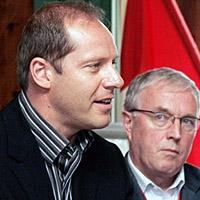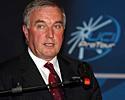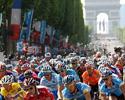News feature, August 22, 2008
ProTour: Bouncing back or lame duck?
By Shane Stokes

|
It looked dead in the water one month ago when all the teams concerned announced that they would not be looking for ProTour licences from 2009 onwards, but Monday's announcement of a new UCI World Calendar means that the series will continue. That's according to UCI President Pat McQuaid, who believes that the peace deal will restore faith in the ProTour system.
"The licences will continue, the ProTour will continue," McQuaid told Cyclingnews. "The UCI can now work to develop all the objectives [of the series] in a peaceful, serene environment, which will have no conflicting effect on the effect on the historical calendar. We can work for the benefit of those organisers and those teams which are in the ProTour.
"The objectives of the ProTour will continue, namely to bring stability, quality, good administration and things like that into the top end of cycling," he added.
Under the announced terms of the UCI World Calendar, the results of the ProTour races planned for 2009 onwards will be joined by those of the historical monuments in calculating a new ranking for individuals and teams. The latter races are those run by the Grand Tour organisers and, with all these races considered, the biggest events in cycling will be included under the same structure.
According to McQuaid - and to the UCI's statement on the developments - the deal was actually brokered with the Editions Philippe Amaury (EPA - the owner of Amaury Sport Organisation and Société du Tour de France) rather than with the organiser itself. ASO has been the biggest opponent of the ProTour system and, at the time of writing, was yet to comment and thus confirm that it would abide by the announced terms.
"The licences will continue, the ProTour will continue."- UCI President Pat McQuaid is confident for the future |
Many of those within the sport are waiting for ASO's response before making a judgement on how successful the new system would be, including ProTour managers such as Bob Stapleton, Hans Michael Holczer and Gerry Van Gerwen. All three said that while they are hopeful about what is proposed, it was too soon to say that the political battle in cycling was at an end.
However McQuaid is convinced that ASO will end up backing the plan. "We dealt with EPA as it had initially made contact with the International Olympic Committee and asked that it wanted mediation," he said. "EPA owns ASO and the Société du Tour de France, so they will act under the instruction of their superiors."
If the race organiser does agree to the terms, it's almost guaranteed that Giro d'Italia organiser RCS Sport and Vuelta a España owner Unipublic will do likewise. That would greatly improve the situation in the sport.
Advantages?

|
The biggest concern for teams this season has been participation in the Tour de France. When the ProTour was first launched, licences were sold to teams on the basis that they would gain entry to all the major races. The Tour de France is by far and away the most important race of the year, and being able to tell their sponsors that they would be part of the July peloton gave valuable leverage in discussing contracts and budgets.
ASO was never happy with this, saying that it didn't want to be forced to take teams and, consequently, to leave others out, due to limitations in numbers. It argued that as the Tour was its event, it should have a say in who gets to ride. The organiser also faulted the ProTour as being a closed structure, with no system of promotion or relegation.
According to the UCI's recent announcement, the next two seasons will see teams' participation governed by the agreement signed by them and ASO on 18 June. But, from 2011 onwards, the classifications of the UCI World Calendar would confer the right to participate, with either 17 teams of nine riders or 18 teams of eight taking part. That would represent a peloton of either 153 or 144 riders, and would thus enable ASO, and the other Grand Tour organizers, to select several wildcard teams.
Stapleton has a strong background in business and told Cyclingnews that he could see some clear possible advantages with what is planned.
"Firstly, it is creating a Unified World Calendar, and ultimate jurisdiction of the UCI in coordinating and operating it," he said. "It appears that this will combine the ASO/RCS events with the existing ProTour Calendar, with a few events potentially added to the ProTour calendar. This keeps the sport under a predictable, common-rules structure and governance.

|
"Secondly, [it features] the continuation of the ProTour as a circuit of races and elite teams, with automatic participation within the ProTour ecosystem," he added. "The ProTour can pursue global expansion and offers events a package of teams and athletes to participate, while ASO and RCS and others can develop their events with independence.
"And, thirdly, it is creating a 'World Ranking' or team standing system - where entry into the Tour De France and potentially other top races would be determined by the actual combined results of the individual teams," said Stapleton. "This will be heavily debated, but will take the shape a merit based system determining the selection of the majority of team spots in races. Organisers will keep wildcard and self-determined entry rights for remaining entry spots, which they have fought for and earned."
Stapleton, like Holczer and Van Gerwen, stresses that ASO's response is needed before knowing if the UCI World Calendar system could work.
McQuaid says that the fine details still need to be worked out, but that it should enable things to move forward again. And that includes the UCI's series.
"I would expect the teams who have been doubtful about renewing their ProTour licence will all now renew them [now]," he said. "We will then go forward with the objectives of the ProTour."
What's next?

|
If ASO and the other organisers agree with the broad outline of what was announced, all the parties concerned can sit down in a more positive frame of mind and begin to work on the small print. McQuaid said that everything pinpointed on Monday should go ahead.
"During the discussions we have had, the elements which we have proposed today have been agreed," he said after the announcement. "They [EPA] have agreed to those things, so I would expect ASO to respond positively. There are still some outstanding issues such as legal proceedings, things such as the suspension of the French federation and issues in relation to that that we still have to work out.
"I would imagine that with a positive response from the Amaury group on this proposal, that we would then get down to dealing with those issues, getting those out of the way as soon as possible so that everybody is working together," he added.
McQuaid said that he hopes everything to be resolved before the UCI Congress in September, so that the French federation can be reinstated there.
Of course, having two ranking systems means that there would in theory be two riders and two teams at the top of each. When asked if there would be both an official ProTour champion and a World Calendar champion, he said that the logistics of that would have to be studied.
"There will be a ranking, so there will be a world number one based on the ranking of the best races in the world, which will be the historical calendar races and the ProTour events," he confirmed. "So the world's number one will be the world's number one, and the best team in the world will be the best team in the world. Whether we have a separate ProTour ranking is something we will have to look at."
The UCI's press release didn't give a rundown of the races on the planned calendar, but McQuaid said that all the ProTour races and the monuments are expected to be there. This would include races that were not on the UCI calendar in 2008.
"We would anticipate that ASO will ask to have their races registered with the UCI, the Tour de France and Paris-Nice, which were not registered this year," he said. "I would expect them to ask for them to go into the Historical Calendar, and we will consider that."
The ProTour itself will continue to grow and develop, with a race in Sochi, Russia due to begin next season. Earlier this year it emerged that the event would take place in May 2009, overlapping the Giro d'Italia. However, McQuaid says now that the dates still need to be finalised, and so too those relating to a Tour of China.
"We don't know exactly when [the race in Sochi] will take place," he said. "We have got to sit down and work out the pros and cons and the benefits. To discuss with the Russian authorities when is best for their race, from their point of view, and when it best suits with the calendar and the teams and all that.
"After that, we will take a democratic decision," he added. "The race will go ahead in 2009. And, while I am here in China, there are still ongoing discussions over the Tour of China. We don't know if it will happen in 2009 or 2010, but the discussions are positive and are ongoing."
The next month or so will reveal a lot about the likely outcome of the new plan. Much needs to be finalised, but if the major shareholders do sit down together and discuss things in a more open way, then the sport will already be moving a step closer towards a healthier political climate. That can only be good news for cycling, which so often has been left with battles and bruises in recent years.

